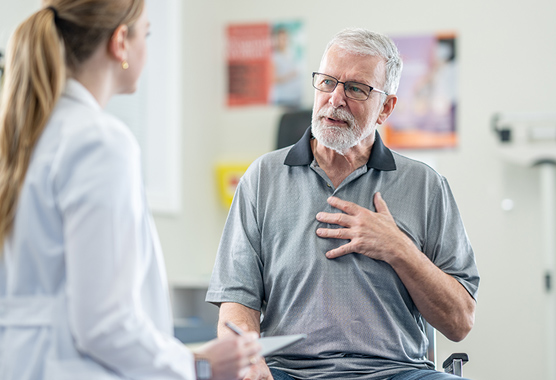Antibiotic Resistance
Antibiotic resistance is challenging to treat. At UC Davis Health, you will receive care from our nationally recognized team of infectious disease experts.
Medically reviewed by Scott Crabtree, M.D. on Nov. 28, 2023.

Infectious Disease Care for You
Experts at the UC Davis Health Division of Infectious Diseases treat common and rare drug-resistant bacterial infections. Our team is nationally recognized for infection prevention and care.
What Is Antibiotic Resistance?
Antibiotic resistance occurs when bacteria stop responding to antibiotic medicine that typically kills them. Often, the bacteria resist several antibiotics (multi-drug resistance). Providers also use the terms antibiotic-resistant bacteria and superbugs.
Bacteria are tiny organisms that live on your skin, inside your body, on the ground and in water. Bacteria don’t always cause problems. But sometimes, they quickly reproduce on or inside your body. This leads to bacterial infections.
Common antibiotic-resistant infections include:
- C. diff (Clostridioides difficile)
- Gonorrhea (a sexually transmitted infection or STI)
- MRSA (Methicillin-resistant Staphylococcus aureus)
- Staph infections (Staphylococcus aureus)
- Streptococcus pneumoniae (a cause of pneumonia)
- Tuberculosis (a respiratory infection)
Symptoms of Antibiotic-Resistant Bacteria
Drug-resistant bacteria cause different symptoms depending on the type of bacterial infection. You should talk with your health care provider about your specific symptoms.
Causes of Antibiotic-Resistant Infections
Changes (mutations) in bacteria lead to antibiotic resistance. These changes turn the bacterium into superbugs. The germs can fight the medicine that normally kills them.
Antibiotic Misuse or Overuse
Taking antibiotics when you don’t need them (like for a viral infection) or not taking antibiotics exactly as prescribed can allow bacteria to mutate and multiply.
Spontaneous Mutation
The genetic makeup (DNA) of bacteria may change spontaneously for no known reason. An antibiotic may not recognize this changed bacteria, or the change may help the germ fight the medication.
Transmitted Mutation
Bacterial infections are contagious. Someone can pass drug-resistant bacteria to you through blood or body fluids.
Risk Factors for Antibiotic-Resistant Infections
Anyone who takes antibiotics may develop an antibiotic-resistant infection. These factors increase your risk.
Age
Older people are more likely to develop conditions like pneumonia and C. diff that require antibiotics.
Inpatient Care
People who receive care in hospitals and group care facilities are more at risk for bacterial infections like MRSA, staph infections and C. diff.
Weak Immune System
A weakened immune system, from autoimmune diseases, immunosuppressant drugs, HIV/AIDS or organ transplants, makes you prone to bacterial infections and antibiotic resistance.
Diagnosis and Testing of Antibiotic-Resistant Infections
Our providers quickly diagnose antibiotic-resistant infections using these tests:
- Blood test to check for bacteria
- Bacteria culture test to examine cells from tissue or fluid samples
- Antimicrobial susceptibility test (AST) to determine the most effective antibiotic for the drug-resistant bacterial infection
Treatments for Antibiotic-Resistant Infections
Drug-resistant bacteria are very difficult to treat because they don’t respond to most antibiotics. The treatment you receive will depend on the severity of your symptoms and how the infection affects your body.
Antibiotics
You may receive more than one antibiotic at the same time or higher doses of oral or IV antibiotics. They may cause more severe side effects.
Preventing Antibiotic-Resistant Infections
These steps may lower your risk of developing antibiotic-resistant infections.
Follow Instructions for Medication
Take antibiotics as prescribed by your provider. It’s important to take all the medication, even if you feel better. Stopping treatment too soon can allow surviving bacteria to multiply, which contributes to drug resistance.
Practice Good Hygiene
To lower your risk of a bacterial infection, wash your hands before cooking or after visiting the bathroom. Avoid sharing utensils and personal hygiene items like toothbrushes.
Thoroughly Cook Meat
Livestock treated with antibiotics can develop antibiotic-resistant infections. When cooking meat, make sure the temperature is high enough to kill any bacteria inside.
Infection rate
2.8MAntibiotic-resistant bacterial infections occur in the U.S. every year
Annual deaths
35KAmericans die from drug-resistant bacterial infections
Source: National Foundation for Infectious Diseases: Antibiotic Resistance
Request an Appointment
As Sacramento's No. 1 hospital, you'll benefit from unique advantages in primary care and specialty care. This includes prevention, diagnosis and treatment options from experts in 150 specialties.
Referring Physicians
To refer a patient, submit an electronic referral form or call.
800-4-UCDAVIS
Patients
Call to make an appointment.
Consumer Resource Center
800-2-UCDAVIS

Ranked among the nation’s best hospitals
A U.S. News & World Report best hospital in cardiology, heart & vascular surgery, diabetes & endocrinology, ENT, geriatrics, neurology & neurosurgery, and pulmonology & lung surgery.

Ranked among the nation’s best children’s hospitals
U.S. News & World Report ranked UC Davis Children’s Hospital among the best in pediatric nephrology, orthopedics*, and pulmonology & lung surgery. (*Together with Shriners Children’s Northern California)

Ranked Sacramento’s #1 hospital
Ranked Sacramento’s #1 hospital by U.S. News, and high-performing in aortic valve surgery, back surgery (spinal fusion), COPD, colon cancer surgery, diabetes, gynecological cancer surgery, heart arrhythmia, heart failure, kidney failure, leukemia, lymphoma & myeloma, lung cancer surgery, pacemaker implantation, pneumonia, prostate cancer surgery, stroke, TAVR, cancer, orthopedics, gastroenterology & GI surgery, and urology.

The nation’s highest nursing honor
UC Davis Medical Center has received Magnet® recognition, the nation’s highest honor for nursing excellence.

World-class cancer care
One of ~59 U.S. cancer centers designated “comprehensive” by the National Cancer Institute.

A leader in health care equality
For the 13th consecutive year, UC Davis Medical Center has been recognized as an LGBTQ+ Healthcare Equality Leader by the educational arm of America’s largest civil rights organization.

